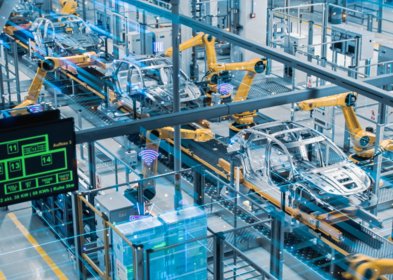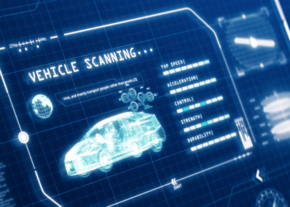
The role of Artificial Intelligence in car design
Enrica Lazzarini
AI is redefining automotive production, from advanced design to vehicle safety, changing the rules of the entire sector.
Artificial intelligence (AI) is revolutionizing the automotive industry, influencing every aspect of vehicle design, production, and maintenance. Automotive companies were among the first to test and leverage AI’s potential to significantly improve the safety, efficiency, and innovation of their products.
In the design phase, for example, AI is used to simulate extremely detailed virtual crash tests. According to a study by the Fraunhofer Institute for Industrial Mathematics (ITWM), using AI for crash test simulations can predict and improve the structural weaknesses of vehicles, reducing the number of prototypes needed (Fraunhofer ITWM, 2021). This not only speeds up production times but also significantly reduces research and development costs.
Material optimization is another field where artificial intelligence is making a mark. Machine learning algorithms can analyze countless combinations of materials to find the lightest and strongest solutions: the use of advanced composites and light alloys allows for the creation of more efficient and less polluting vehicles. According to a study published in Materials Today in 2020, AI can reduce the weight of cars by up to 10% while simultaneously improving structural strength.
In the production context, automated assembly lines implement AI systems to monitor and optimize every phase of vehicle construction. This approach reduces waste and improves precision, ensuring superior quality control. According to the McKinsey Global Institute, the adoption of AI in automotive production could increase efficiency by 30% (McKinsey, 2018). AI-equipped robots are able to identify and correct defects in real time, reducing the incidence of defective products and improving overall reliability.
Post-sales automotive also greatly benefits from AI: advanced diagnostic systems can predict failures and malfunctions, offering predictive maintenance that enhances the consumer experience, thereby reducing vehicle downtime. According to Frost & Sullivan, by 2025, 15% of cars will be equipped with AI-based predictive maintenance systems.
Thus, while artificial intelligence makes production more efficient, it can also offer new business opportunities for all aftermarket service providers. Continuous training and updating of skills are essential for industry professionals, who must be able to manage advanced diagnostic tools and follow advanced maintenance protocols.
In the design phase, for example, AI is used to simulate extremely detailed virtual crash tests. According to a study by the Fraunhofer Institute for Industrial Mathematics (ITWM), using AI for crash test simulations can predict and improve the structural weaknesses of vehicles, reducing the number of prototypes needed (Fraunhofer ITWM, 2021). This not only speeds up production times but also significantly reduces research and development costs.
Material optimization is another field where artificial intelligence is making a mark. Machine learning algorithms can analyze countless combinations of materials to find the lightest and strongest solutions: the use of advanced composites and light alloys allows for the creation of more efficient and less polluting vehicles. According to a study published in Materials Today in 2020, AI can reduce the weight of cars by up to 10% while simultaneously improving structural strength.
In the production context, automated assembly lines implement AI systems to monitor and optimize every phase of vehicle construction. This approach reduces waste and improves precision, ensuring superior quality control. According to the McKinsey Global Institute, the adoption of AI in automotive production could increase efficiency by 30% (McKinsey, 2018). AI-equipped robots are able to identify and correct defects in real time, reducing the incidence of defective products and improving overall reliability.
Post-sales automotive also greatly benefits from AI: advanced diagnostic systems can predict failures and malfunctions, offering predictive maintenance that enhances the consumer experience, thereby reducing vehicle downtime. According to Frost & Sullivan, by 2025, 15% of cars will be equipped with AI-based predictive maintenance systems.
Thus, while artificial intelligence makes production more efficient, it can also offer new business opportunities for all aftermarket service providers. Continuous training and updating of skills are essential for industry professionals, who must be able to manage advanced diagnostic tools and follow advanced maintenance protocols.






















